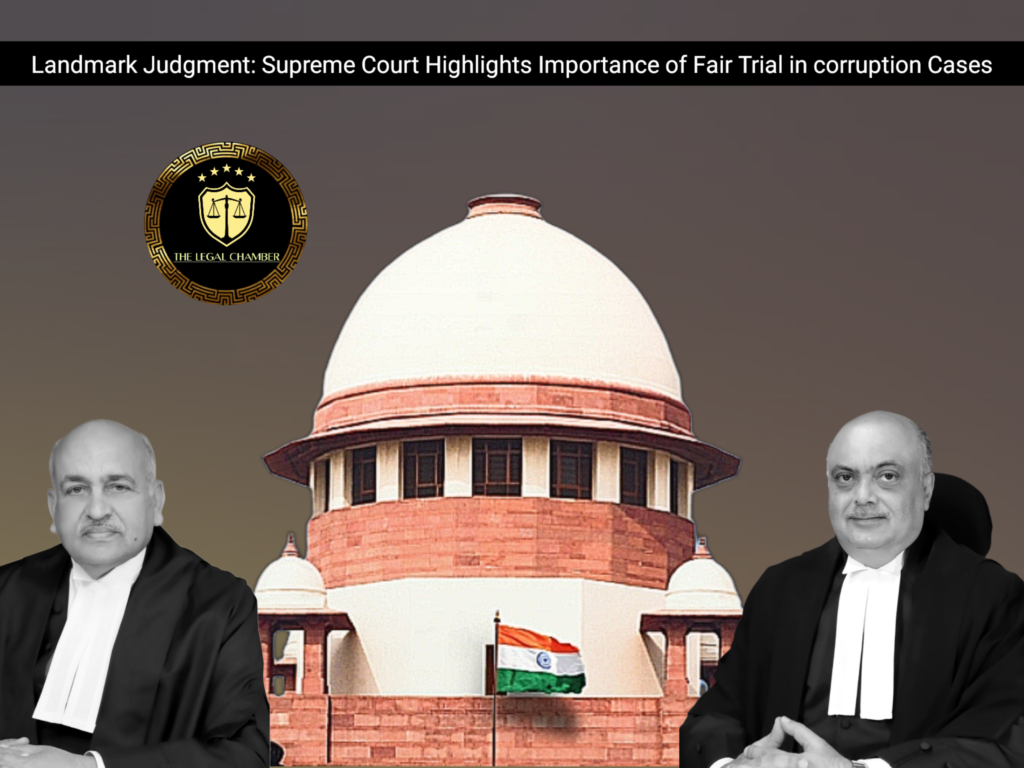
The Supreme Court acquitted the appellant, overturning the High Court’s conviction under Sections 7, 12, and 13 of the Prevention of Corruption Act, 1988, and Section 120B IPC. The Court held that the prosecution failed to prove demand and acceptance of bribe beyond reasonable doubt, citing material contradictions, lack of corroborative evidence, and procedural lapses in the trap proceedings. It emphasized the double presumption of innocence in acquittal appeals and ruled that conjectures cannot substitute legal proof. The judgment reaffirmed that mere recovery of tainted money, without conclusive proof of demand, is insufficient for conviction under anti-corruption laws.
Facts Of The Case:
The case involved M. Sambasiva Rao, an Assistant Administrative Officer at United India Insurance Company, Guntur, who was accused of demanding a bribe of ₹40,000 from T. Kotireddy (PW1), the complainant, for expediting an insurance claim settlement. The claim pertained to the accidental death of L. Laxman Reddy, whose wife (PW2) was the nominee. The prosecution alleged that Rao sought the bribe for himself and N. Govindarao Naidu (Accused No. 2), the Regional Manager, to ensure claim approval. When Kotireddy refused, he lodged a complaint with the CBI, leading to a trap operation. During the trap, Rao’s brother (Accused No. 3) allegedly accepted the money and a whisky bottle on behalf of Rao and Naidu at Naidu’s residence. The trial court acquitted all accused, but the High Court reversed the decision, convicting Rao and his brother. On appeal, the Supreme Court scrutinized the evidence, noting inconsistencies—such as discrepancies in witness testimonies, the unexplained presence of the SP during the trap, and the mismatch in the seized shirt’s color. The Court concluded that the prosecution failed to prove demand and acceptance of bribe beyond doubt, reinstating the trial court’s acquittal and emphasizing the presumption of innocence in criminal trials.
Procedural History:
The case originated with the trial court (Special Judge for CBI Cases, Visakhapatnam) acquitting all accused in 2005, holding that the prosecution failed to prove the charges under the Prevention of Corruption Act, 1988, and Section 120B IPC. The State of Andhra Pradesh appealed to the High Court of Judicature at Hyderabad, which in 2015 reversed the acquittal, convicting the appellant (M. Sambasiva Rao) and his brother under Sections 7, 12, 13(2) read with 13(1)(d) of the PC Act and Section 120B IPC, sentencing them to one year’s rigorous imprisonment. The appellant then approached the Supreme Court, challenging the High Court’s judgment. In 2025, the Supreme Court allowed the appeal, setting aside the conviction and restoring the trial court’s acquittal. The apex court held that the High Court erred in reversing the acquittal without sufficient legal grounds, emphasizing prosecution lapses, lack of conclusive evidence on bribe demand, and material contradictions in witness testimonies. The judgment reinforced the principle that appellate courts must exercise caution before overturning acquittals, especially where two plausible views exist.
READ ALSO :Landmark Judgment: Supreme Court Upholds LMV License Validity for Commercial Vehicles
Court Observation:
The Supreme Court made several critical observations while overturning the High Court’s conviction. It emphasized that proof of demand and acceptance of illegal gratification is indispensable under Sections 7 and 13 of the Prevention of Corruption Act, 1988, and the prosecution failed to establish this beyond reasonable doubt. The Court noted material contradictions in witness testimonies, including discrepancies about the seized shirt’s color, the SP’s unexplained presence during the trap, and inconsistent accounts of the bribe handover. It rejected the High Court’s conjectural reasoning, such as assuming phenolphthalein powder transferred from currency to a whisky box without evidence. The judgment underscored the double presumption of innocence favoring the accused in acquittal appeals and reiterated that mere recovery of tainted money is insufficient for conviction without proof of demand. The Court also highlighted procedural lapses, including the lack of independent corroboration of the bribe demand and the belated preparation of mediators’ reports. Ultimately, it ruled that the prosecution’s case suffered from unreliable evidence and speculative inferences, warranting acquittal.
Final Decision & Judgement:
The Supreme Court allowed the appeal, setting aside the High Court’s conviction and restoring the trial court’s order of acquittal. It held that the prosecution failed to prove the essential elements of demand and acceptance of bribe under Sections 7, 12, and 13 of the Prevention of Corruption Act, 1988, as well as criminal conspiracy under Section 120B IPC. The Court emphasized that mere recovery of tainted money, without cogent proof of demand, cannot sustain a conviction in corruption cases. It noted serious lapses in the trap proceedings, including material contradictions in witness statements, lack of independent corroboration, and unexplained procedural irregularities. Criticizing the High Court’s speculative reasoning, the judgment reaffirmed the double presumption of innocence in favor of the accused in appeals against acquittal. The Court concluded that the prosecution’s case was riddled with doubt, making the conviction legally unsustainable. Consequently, the appellant was acquitted of all charges, and any fines paid were ordered to be refunded. The judgment reinforced the principle of “beyond reasonable doubt” in criminal trials and cautioned appellate courts against disturbing acquittals without compelling evidence.
Case Details:
Case Title:M. Sambasiva Rao vs. The State of Andhra Pradesh Citation:(2025) INSC 868 Criminal Appeal No.:Criminal Appeal No. 391 of 2017 Date of Judgment:July 17, 2025 Judges/Justice Name: Justice Pankaj Mithal & Justice Ahsanuddin Amanullah
Download The Judgement Here